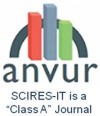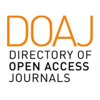Articles
Abstract
The projection of a moving image on the surfaces of objects and architectural works can now be viewed as a well-established communicative process within which techniques evolve, even if in essence their form and structure may be regarded as technologically stable. What project context will emerge if, instead of being static, the surfaces that are object of projection vary their form and position in three-dimensional space? This paper investigates the design context of video mapping through a short survey of a series of case studies in which the tracking of the movement of artefacts is recognized thanks to processes of computer vision that give rise to novel elements of interaction between people, objects and the space.
Keywords
Video mapping; realtime; tracking; projection; surfaces; architecture
Full Text:
PDFDOI: http://dx.doi.org/10.2423/i22394303v7n2p27
References
Article Metrics
Metrics Loading ...
Metrics powered by PLOS ALM
Refbacks
- There are currently no refbacks.
Copyright (c) 2017 Michele Zannoni

This work is licensed under a Creative Commons Attribution-NonCommercial-NoDerivatives 4.0 International License.
SCIRES-IT, e-ISSN 2239-4303
Journal founded by Virginia Valzano





